Oct 17, 2025 – Dharma Q&A and Invited Lecture at Korea National Open University
Hello. Today is scheduled for the Friday Dharma Q&A and an invited lecture at Korea National Open University.
Sunim departed from Dubuk Jungto Retreat Center at 3 AM and arrived at Seoul Jungto Center at 6 AM after a three-hour drive.
After breakfast and a brief rest, the Friday Dharma Q&A live broadcast began at 10 AM from the broadcasting room at Jungto Center.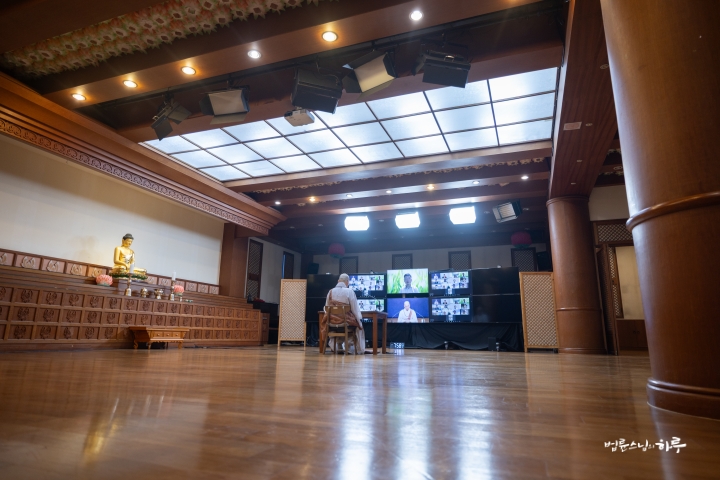
Usually, the Dharma Q&A live broadcast is held every Friday evening. However, today’s morning session is held once a month for those who find it difficult to watch during the evening hours in Korea. Since morning in Korea is evening in the United States, Korean Americans can watch the lecture after work in the evening, making it a time they look forward to. Due to overseas schedules, it has been difficult to broadcast in the morning, but today Sunim is in Korea, making the morning Dharma Q&A live broadcast possible.
The conversation began with over 2,600 people connected to the YouTube live stream. Four people pressed the raise hand button to ask Sunim questions. One of them expressed frustration, saying that despite giving all his assets to his wife for the family, she doesn’t fulfill any household duties.
I’ve Given All My Assets to My Wife, but She Won’t Even Make Me Breakfast
From what I can see, you don’t have bad intentions, but you seem a bit foolish. In the past, men worked outside and women did housework. So wives did laundry, cleaned, took care of children, and cooked. But now we live in an era where both men and women work. These days, it’s common for couples to work together, cook together, clean together, and take care of children together. If your wife doesn’t work outside the home, you could argue that she should take on more cooking and cleaning duties, but socially, that’s not something you can demand anymore.
In China, when people get married, the men cook. So when a Korean mother-in-law whose son married a Chinese woman visits her son’s house, she’s shocked. She has to watch her daughter-in-law lying in bed until morning while her son cooks, feeds the children, sends them to school, and wakes up his wife. The wife doesn’t get up even when woken. This is a cultural difference. In that culture, that’s how people live. In our country, it’s the opposite. Usually, men sleep late while women prepare breakfast. Even on memorial service days, men drink and play cards all day while women work non-stop in the kitchen, preparing and serving food. Since you grew up in this environment, you naturally think your wife should cook. But times have changed. If your wife thinks, ‘Thank you, I should at least cook for you’ because you work hard outside and put the house in her name, that would be fortunate. Such people exist, but your wife isn’t one of them. That doesn’t make her a bad woman. She just has a different perspective. 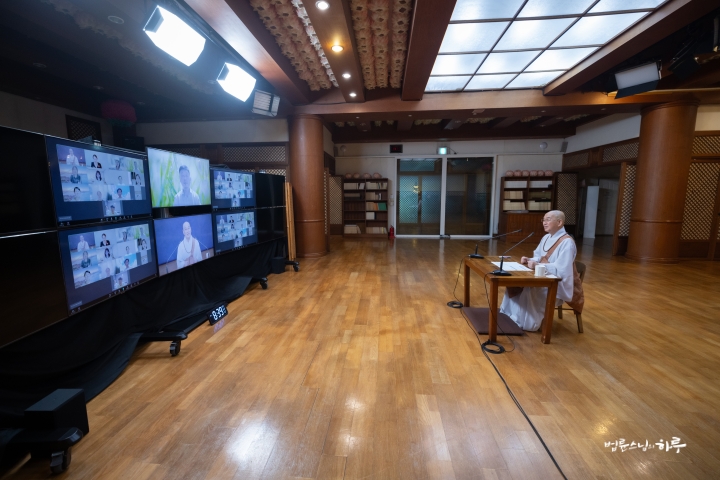
If your wife doesn’t cook for you, you can cook for yourself, wake her up and say, ‘Here’s breakfast. I’m going to work. You should eat too before you go.’ Isn’t that simple? These days at the market, all the ingredients are pre-prepared so you can cook right away or just heat them up. The rice cooker makes rice, and you can buy stew and heat it up. Why are you making yourself miserable, shedding tears and thinking ‘Do I deserve this treatment?’ just because she won’t cook for you? What’s so difficult about it? If you get angry and end up divorcing, all the assets are in your wife’s name – wouldn’t you be the only one losing out? Of course, under current law, whether it’s in the husband’s or wife’s name, everything gets split 50-50 in a divorce. So whose name it’s under isn’t really that important. In the past, if it was in the husband’s name, he would keep it after divorce, but now assets formed after marriage are considered jointly earned even if the husband earned them. So if you divorce, whether it’s in your name or your wife’s name, it will be divided equally. If you’re anxious because everything is in your wife’s name, you can put future business earnings in your name. Just because it’s in her name doesn’t mean she can use it like cash immediately, and she can’t sell the house on her own either. If you’re feeling sorry for yourself because she won’t cook even though you put the house in her name, it seems rather petty.
Also, from what I can tell by your voice and demeanor, you seem to have some psychological depression. That’s why even small things feel heartbreaking to you. If you go to the hospital for a checkup and take some medication to clear your mind, these things will feel trivial. As for divorce, if your children are younger than eighteen, it’s better to wait until they become adults. If they’re over eighteen, divorce is fine if you want to. If you want to divorce, do it; if you want to stay together, stay together. But if you divorce because you’re upset she won’t cook for you, that would be foolish on your part.”
“I have no intention of divorcing. I don’t plan to remarry either. I just want to be treated with respect as the head of the household by my wife. I understand what you’re saying about ‘house ownership’ and ‘cooking’ being separate issues. As you suggested, I did go to a psychiatrist. The hospital said it’s not panic disorder but mild panic symptoms, and I was prescribed medication. I’ve arranged everything legally so that if I shave my head and enter a temple tomorrow, or if I suddenly disappear in a traffic accident, my wife won’t have any legal issues to deal with. Since there’s no property in my name, there’s nothing to look for – everything is already in her name. I really gave her everything. I believe I gave her everything.”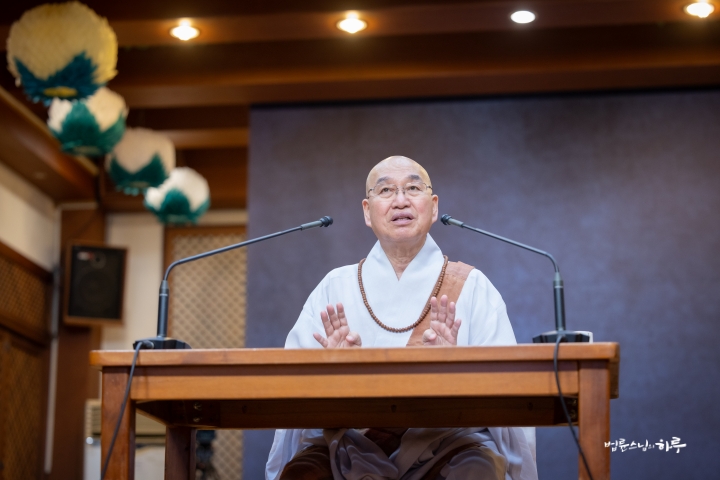
“It’s good that you gave everything to your wife. But what you gave is what you gave – why do you keep connecting it to her not cooking for you?”
“I feel it’s so unfair that my wife can’t even prepare her husband’s breakfast. I’m not expecting one thing in return for giving ten, but I wish she would at least cook for me.”
“It would be nice if your wife cooked for you, but what can you do if she doesn’t want to?”
“That’s why after 15 years of bickering about cooking, I finally emptied my mind and started eating at convenience stores and truck stops. I’m wondering whether I should continue living like this to maintain the marriage, or if I should move out on my own – not divorce, but live separately for comfort.”
“Do whatever is comfortable for you. Even if you live alone, you’ll still have to take care of your own meals, won’t you?”
“No, I won’t cook. I’ll buy my meals.”
“Then it’s even simpler. You can cook for yourself or buy food – why are you suffering so much over meals? Can’t you cook? Don’t you have hands?” 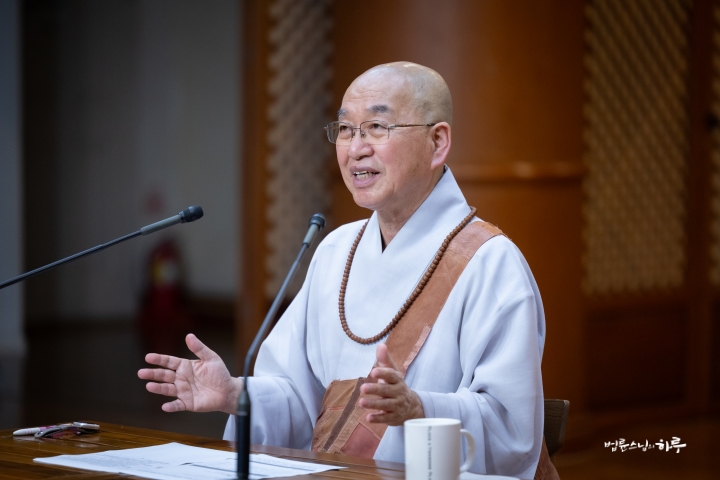
“I’ve tried cooking alone a few times, and it feels so miserable. Even though I’m the sole breadwinner, I do housework. I know my wife has it hard raising the children. But I feel so wronged that she won’t set the breakfast table for her husband who works from dawn to late at night. As this builds up, I want to say ‘You all live on your own.’ The kids are all grown – twenty, twenty-three, and twenty-five years old, with our youngest being seven. When I look at myself objectively, I feel so pathetic. I think, ‘Why have I lived so foolishly?’ and I feel so regretful.”
“If you feel that wronged, why don’t you divorce and find a woman who will cook for you?”
“No, I still have no intention of divorcing.”
“If you find another woman to cook for you while you have a wife, that’s legally problematic. So either divorce and live with a woman who will cook for you, or talk to your wife about hiring a housekeeper to make breakfast every day. You could arrange for a commuting housekeeper to come and prepare breakfast. What’s the point of earning money so hard? Use some of it to solve problems like this. Why do you keep asking your wife to make breakfast when she finds it difficult? What kind of stubbornness is that?”
“I understand. I was very short-sighted.”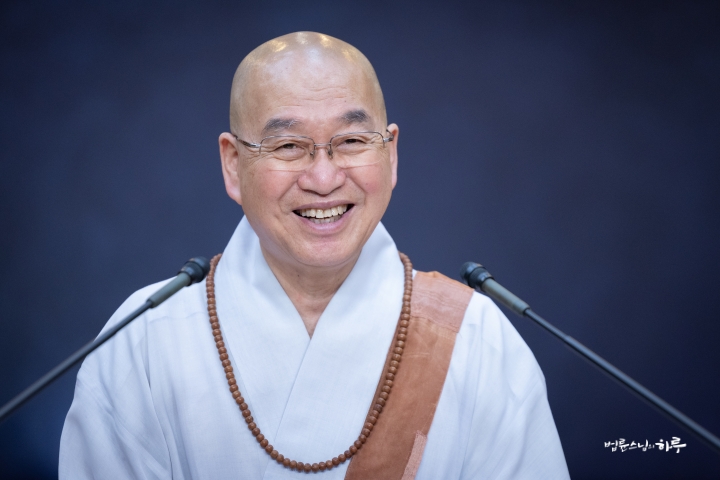
“You’re obsessed with one thought right now. You’re so fixated on ‘breakfast’ that you can’t hear anything else. These days, many people skip breakfast. Even in China, most people buy breakfast. They eat out or buy simple millet porridge, rice porridge, or corn porridge. You could also make simple porridge at home, eat Western-style toast, or make rice in the rice cooker and eat it with kimchi. Why is that so difficult? Why are you demanding someone who doesn’t want to cook to make you food, saying ‘Not cooking for me means you’re disrespecting me’? What’s there to be stubborn about? If everything else is fine except for this issue, then things are fine.”
“I understand. I’ve let go of a lot. I think I shouldn’t hold onto lingering feelings. It seems I keep making demands because I still have many lingering feelings for my wife. I’ll demand nothing and return to my original mindset and just accept things. I’ll think of it as fate and let go. Otherwise, I’ll only hurt myself more. As you said, it doesn’t seem right to force something that won’t work. Thank you.”
“Of course, from your perspective, you might think, ‘I’ve earned all these assets, and she won’t even make me breakfast?’ But that’s the wrong way to think. That approach doesn’t align with Buddhist teachings and shows a lack of understanding of the essence of human relationships. Once you start thinking that way, the marital relationship turns into a calculating one where ‘you should receive as much as you give’ – essentially a transactional relationship.
From your wife’s perspective, she might think, “You chose to put everything in my name because you wanted to, so why are you feeling wronged about it now?” After all, you made that decision yourself. Moreover, times have changed so much that there are hardly any households where all three meals are prepared at home. If you want to eat, you can prepare it yourself or go out and buy it. While some couples communicate well and one might say, “Okay, I’ll cook for you,” if there’s been no change after 15 years of discussion, you need to accept it. 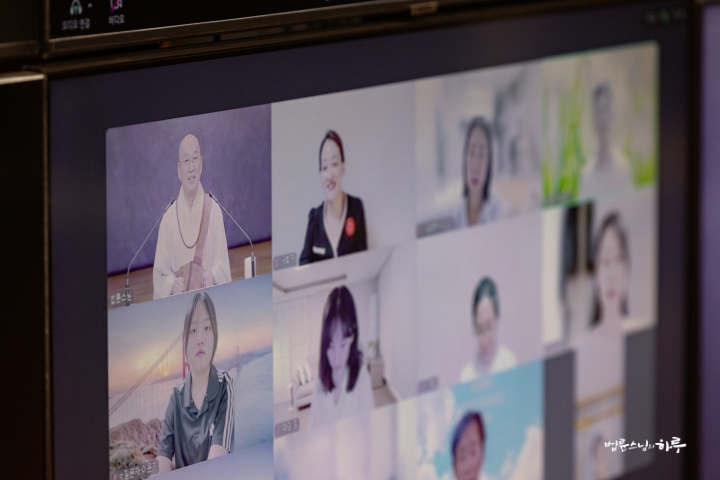
There are various types of people in the world. Some people prepare all three meals, while others don’t prepare even one. That’s their way of doing things. If you try to force something that won’t work, you’ll only end up exhausted and feeling pathetic. It’s wiser to leave what won’t work as it is and find a way to be comfortable within that situation.
What can you do about the fact that everyone is different? Don’t keep holding onto thoughts like ‘I earned the money, so you should at least cook.’ If you want to eat, just cook for yourself or buy food. You need to let go of your attachment. When you’re too attached to one thing, it’s called ‘obsession.’ You’re completely caught up in thoughts like ‘I’ve earned money all my life, how can you not even make breakfast?’ Now it’s time to let go of your thoughts and live comfortably.” 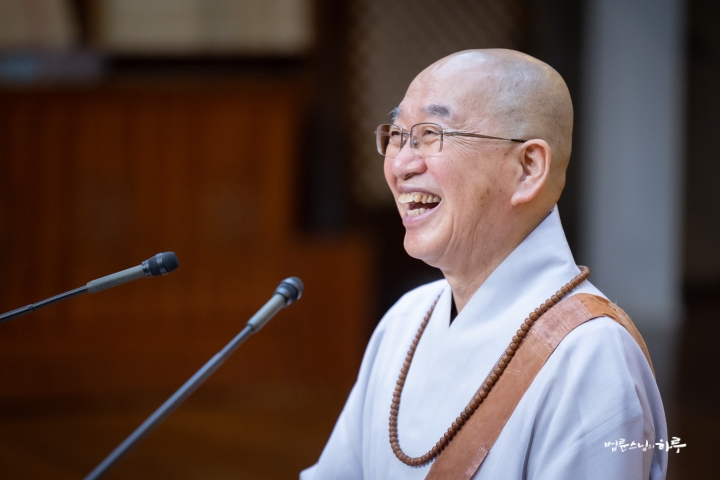
Questions continued to come in.
My son refuses to go to school and insists on dropping out. How can I help him live happily in the future?
I’m considering divorce after experiencing my husband’s verbal and physical abuse, gambling, and infidelity. What decision would be best for my children?
When I listen to Sunim’s teachings, my mind feels at ease, but when faced with profit and loss, my attachments don’t disappear. How can I maintain a mind free from attachment?
After finishing the dialogue, it was almost noon. Sunim shared the news that there would be another Dharma Q&A in the evening at the Jungto Social and Cultural Center, then ended the live broadcast.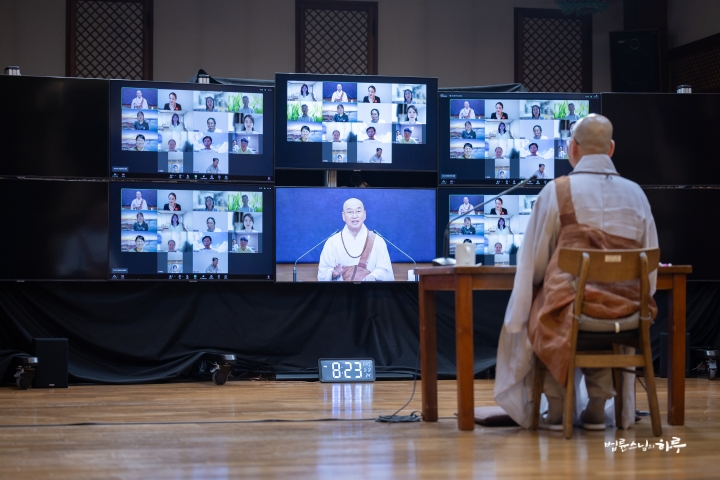
After lunch, at 1:20 PM, Sunim headed to the main building of Korea National Open University in Daehak-ro to give a public lecture organized by the university.

OUN TV hosts public lectures for their lifelong education program , and today they specially invited Venerable Pomnyun Sunim to give a lecture in celebration of their 30th anniversary.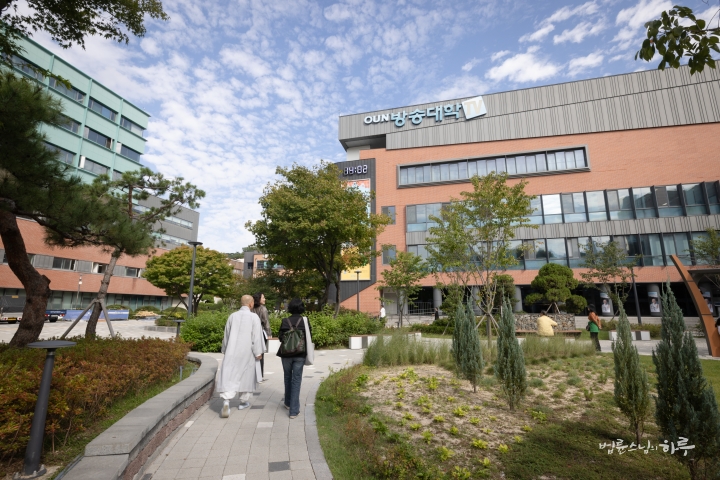
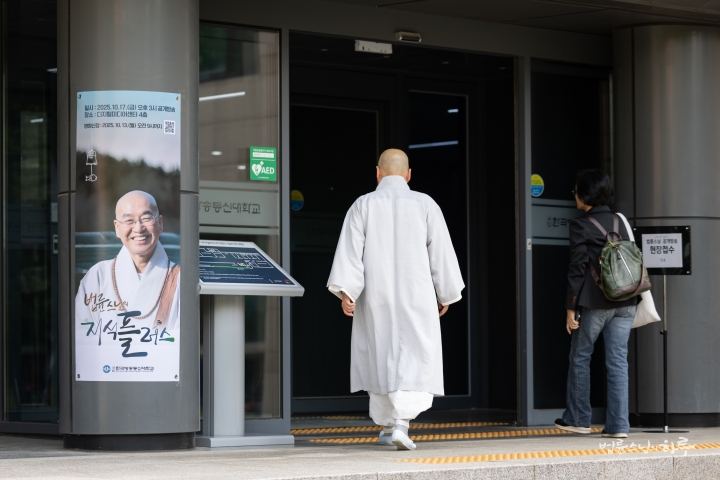
After arriving at the Digital Media Center of the university headquarters, Sunim had a brief meeting with the media team leader, OUN TV writer, and PD. They presented a detailed explanation of today’s lecture topic and program organized in a PPT presentation. After listening to the explanation, Sunim smiled and said,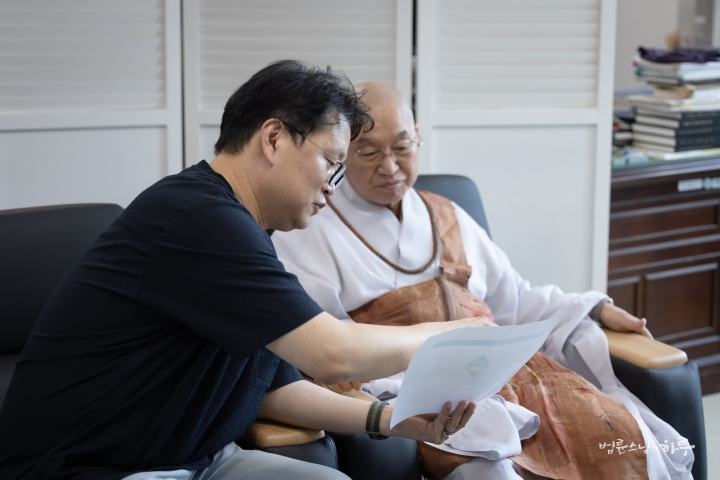
“I have a poor memory, so I won’t be able to remember what’s in the PPT. Just tell me the topic, and I’ll talk about whatever comes to mind.” (laughter)
“Yes, please do whatever is comfortable for you, Sunim.”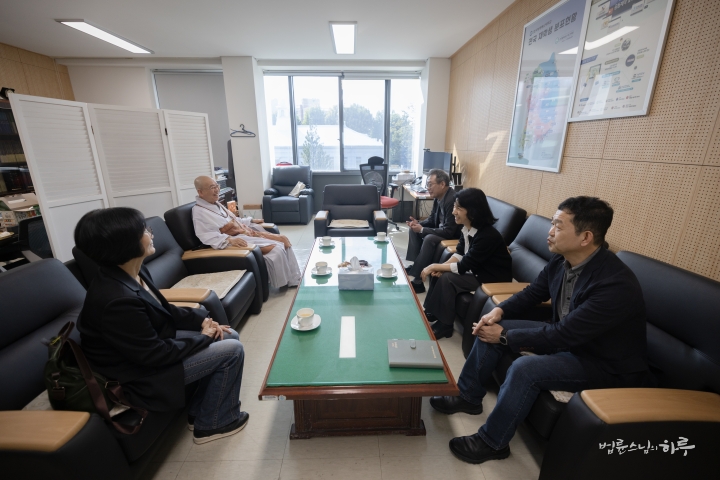
The media team leader mentioned that next year marks the 30th anniversary of OUN TV and carefully asked if they could film Sunim giving congratulatory remarks. Sunim readily agreed to the filming.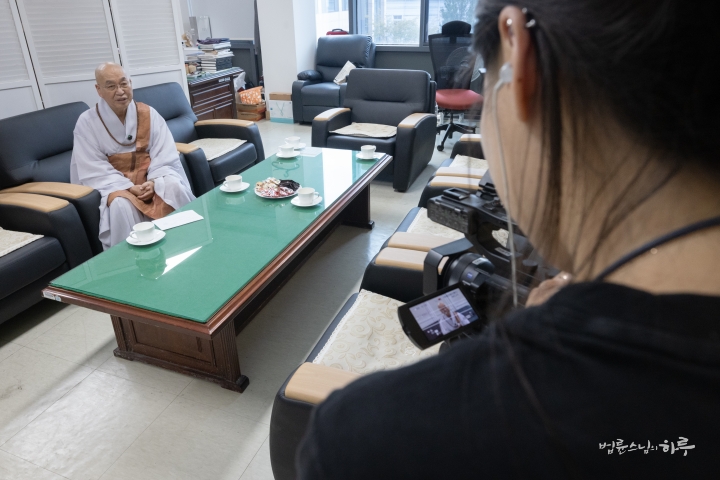
At 3 PM, they headed to the studio.
About 350 Korea National Open University students who had applied for audience seats from all over the country were seated in the studio. Over a thousand people had applied, but due to limited seating, only about 350 could attend in person. Amid loud applause and cheers, Sunim took the stage and gave a keynote lecture on the topic “Is My Life Good As It Is Now?”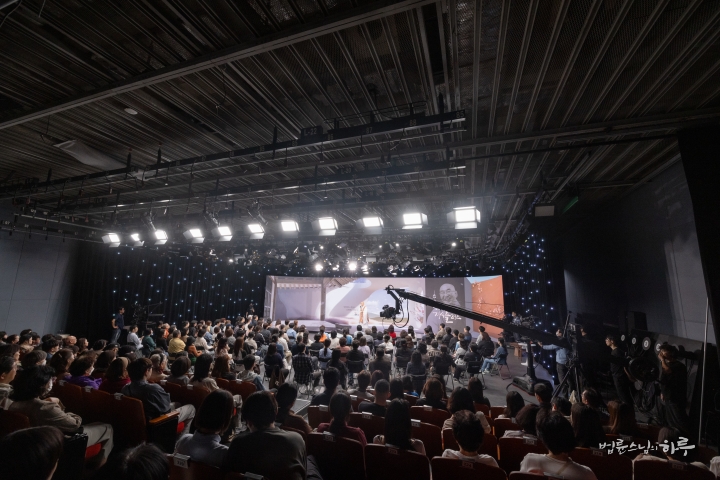
“We are never satisfied with our current lives and live either longing for the past or worrying about the future. When we’re young, we say it’s hard, but when we get old, we envy youth. When we’re alone, we feel lonely, but when we get married, we say it’s hard to live together and envy those who are single. However, life should be good at every stage for what it is. Childhood has its own beauty, youth has its own, and old age has its own beauty and freedom. Old age, when you don’t have to study, don’t have to work, and don’t have to raise children, might actually be the ideal time we’ve dreamed of all our lives. So we need to know how to feel happiness in this very moment, right where we stand. 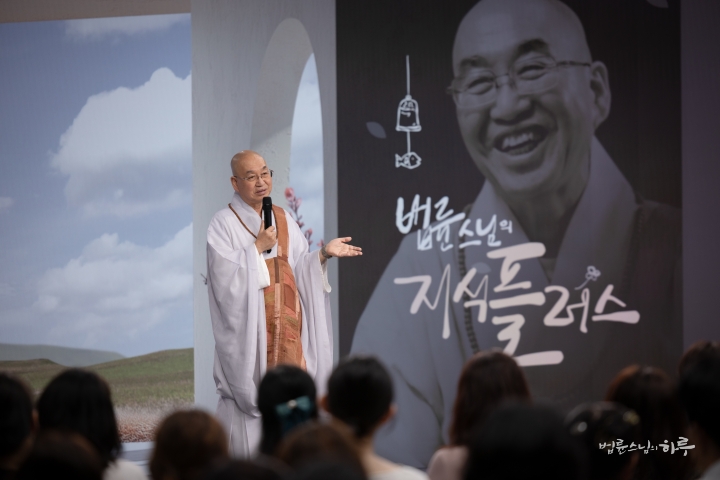
Happiness Comes Not from Conditions but from Accepting This Present Moment
Material abundance does not guarantee human happiness. Over the past 60 years, per capita GDP has increased 360 times from $100 to $36,000, yet our happiness levels have remained virtually unchanged. We believe we’ll be happy if we earn just a little more or have just a little more, but there’s no end to it. Simply being alive, greeting today, and breathing is already a great success. When we affirm and appreciate ourselves as we are right now, we finally develop self-esteem and can be generous toward others. Happiness is not far away—it’s right ‘here and now.'” 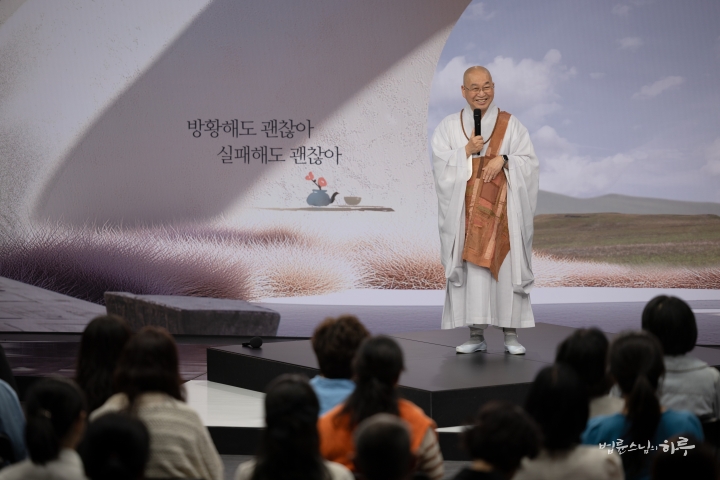
After giving a 50-minute keynote speech, Sunim immediately began the Dharma Q&A session. For one hour, five people asked Sunim questions and engaged in dialogue.
I’ve been so focused on work that even in my 50s, living alone feels lonely. Is it okay to live alone without marriage or dating?
Going through my three daughters’ adolescence has made me feel exhausted and powerless too. How should I manage my mind as a mother so my children can grow up happy?
I constantly compare myself to capable colleagues at work. How can I let go of this comparison and fully accept myself?
Since witnessing my mother’s battle with cancer and death, I’ve been afraid of dying. How can I peacefully accept and prepare for death?
My son, whom I raised to be independent, doesn’t listen to me at all, and people around me say I’m like a ‘pushover mom.’ Did I raise my child wrong?
Through the hour-long Dharma Q&A, the participants’ faces gradually brightened. Although many more people wanted to ask questions, the session ended as the scheduled time was up.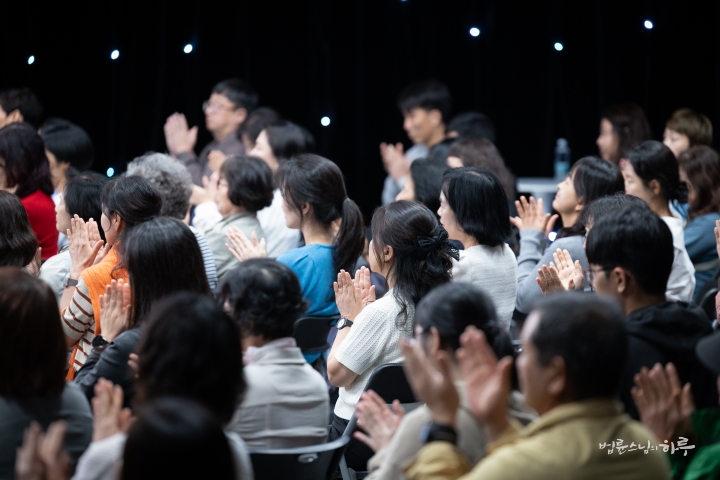
After completing the two-hour lecture, Sunim left Daehangno at 5 PM. Due to heavy rush-hour traffic, he arrived at the Jungto Social and Cultural Center in Seoul at 6:20 PM. A light autumn rain began to fall in Seoul that evening.
Today was the day for the monthly Friday Dharma Q&A at the Jungto Social and Cultural Center. As the sun set, many citizens came to the center after work to attend the Dharma Q&A.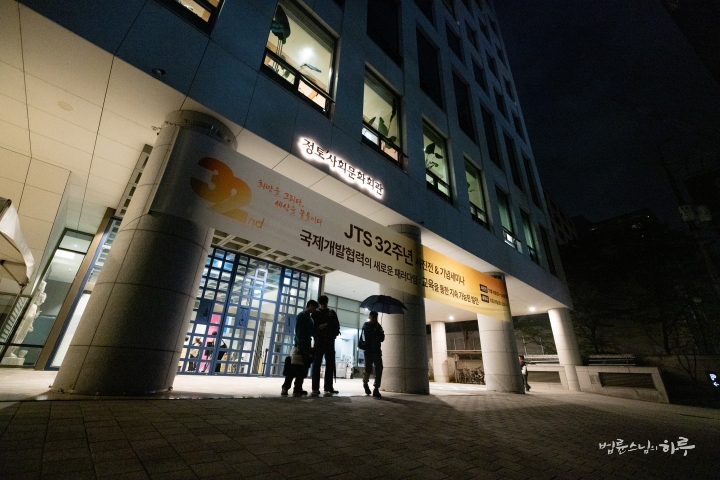
Starting tomorrow, the JTS 32nd Anniversary Photo Exhibition will be held for a week in the underground auditorium of the Jungto Social and Cultural Center. Before the lecture, Sunim took a tour of the photo exhibition.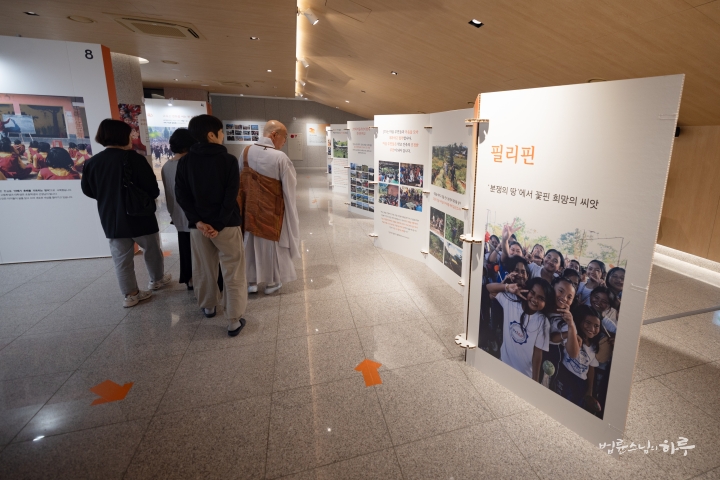
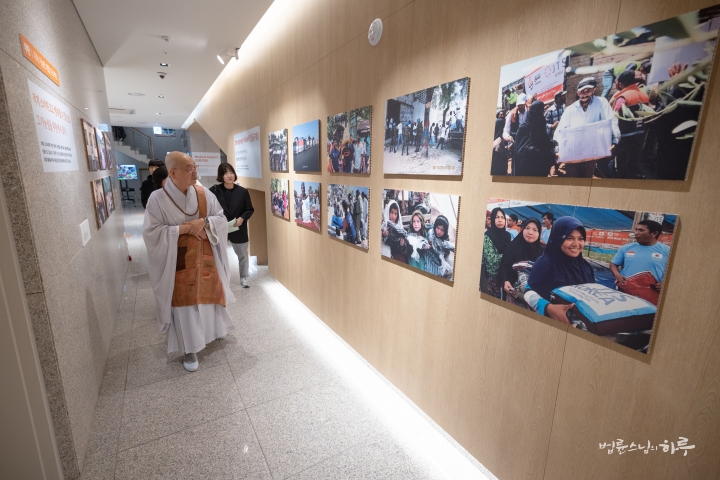
The records of hope and moments of inspiration that JTS has created over 32 years were well displayed in hundreds of photographs. The exhibition also featured actual relief supplies that JTS had provided to various countries including India, the Philippines, Bhutan, and Myanmar. There were hands-on programs where visitors could make keychains from rice bags, and photo zones were set up throughout, allowing visitors to naturally empathize with and participate in JTS’s activities.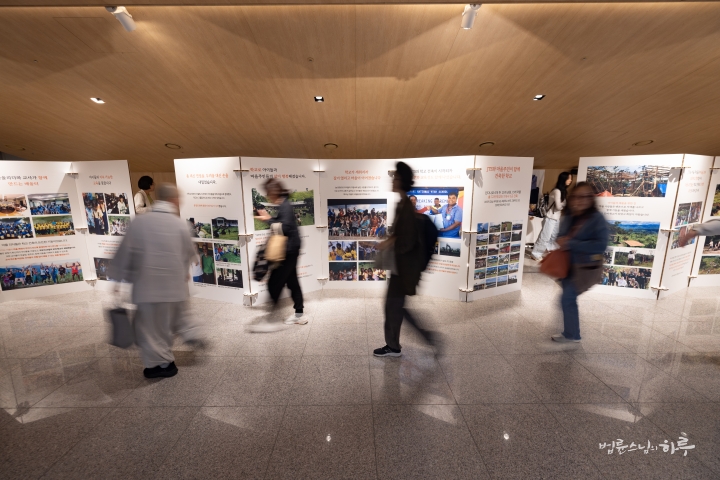
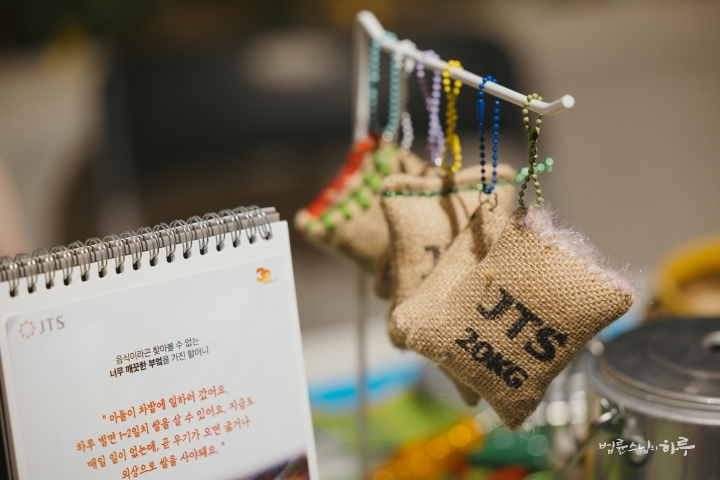
After quickly touring the exhibition, Sunim headed to the underground auditorium to give his lecture. More than 6,000 people, more than usual, were connected on YouTube, and about 250 people were seated in the venue.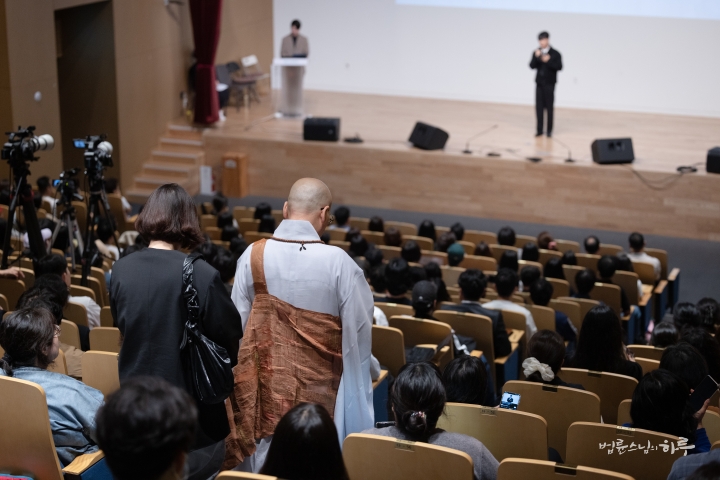
Before the lecture, Kim Ra-gyeol, a young Jungto Society volunteer, sang two songs with a warm voice—”Aloha” and “Prayer of Time”—receiving great applause from the audience.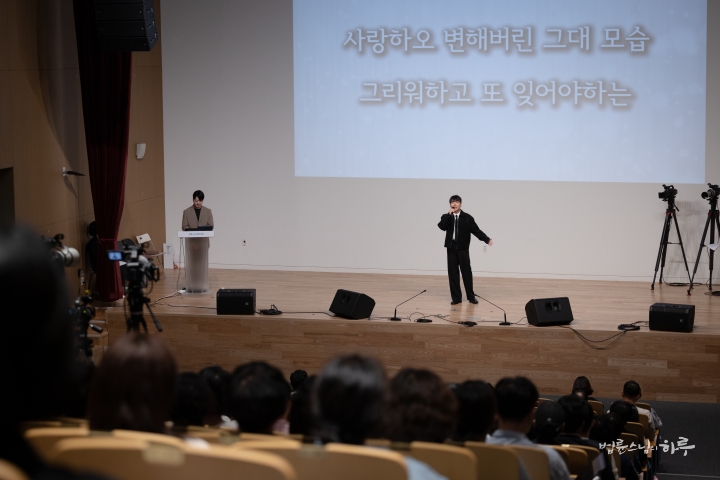
After reciting the Three Refuges and Words for Practice, Sunim took the stage and gave his opening remarks. He began the conversation by talking about the autumn weather with its unusually heavy rainfall.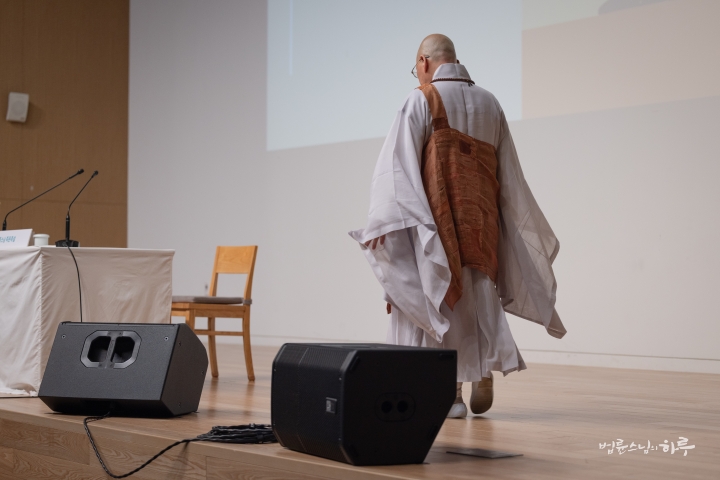
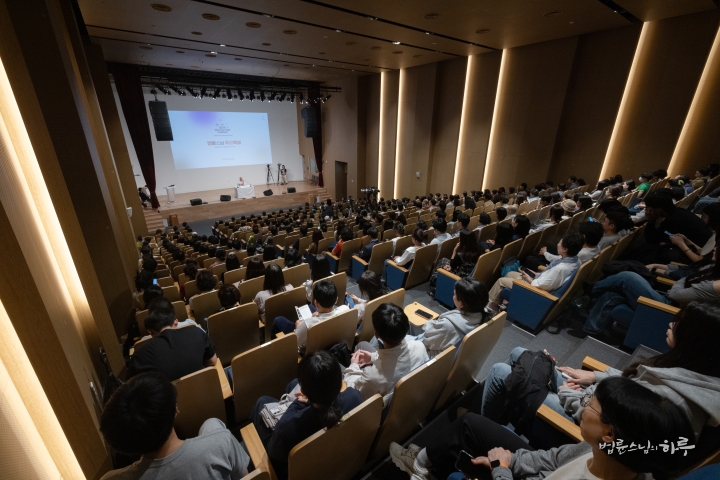
“Today we have quite cool autumn weather. Although autumn has arrived after the hot summer, the continuous rain makes it difficult to see the clear sky that symbolizes Korean autumn. We expected a good rice harvest this year, but with the extended rainy season, we haven’t been able to harvest yet. The rice has ripened and bowed its heads, but with the unceasing rain, most of it has fallen over. When rice stays submerged in water for too long, it begins to sprout, reducing its quality. When milled, the rice breaks into small pieces like millet. So I’m worried that this year’s harvest will be significantly reduced. I don’t know when the rain will stop. Rain is forecast throughout this week and seems likely to continue into next week. We’re also growing rice on about 6,000 pyeong of paddies, but we haven’t been able to start harvesting yet.”
For the next hour and a half, five people raised their hands and had conversations with Sunim. One of them was married with a wife expecting a baby, but he was still confused and disappointed in himself for not having found his path yet, and asked Sunim for advice.
I’m Married with a Baby on the Way, but I Still Haven’t Found My Path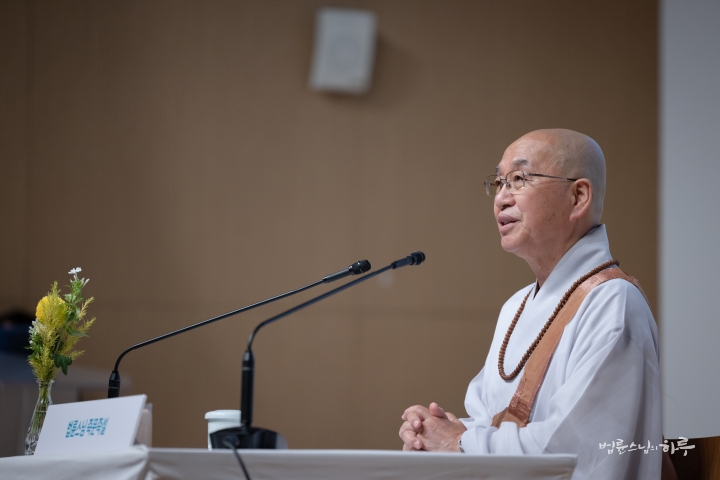
“What is the ideal that you pursue?”
“I’m married and my wife is about to give birth, but I’m still wandering about my career path. I thought by this age I would be settled and able to support my family, but that doesn’t seem to be the case. Another thing is that I decided to practice, but within a week I couldn’t keep my promise to myself, which disappoints me and undermines my self-trust.”
“Let’s look at what you’ve said one by one. First, are you talking about getting up at 5 AM every morning to practice?”
“Yes, that’s right.”
“Why do you stop doing it?”
“When I’m tired and exhausted, I just seem to fall back asleep.”
“Doesn’t your wife wake you up?”
“My wife goes to work later, so she doesn’t wake me up. So we’re sleeping together.”
“That can happen. Among the 8 billion people in the world, do you think more people get up at 5 AM to practice, or more people don’t?”
“I think more people don’t.”
“Then what’s there for you to be particularly disappointed about?”
“It’s because I fail to achieve many of the goals I set.”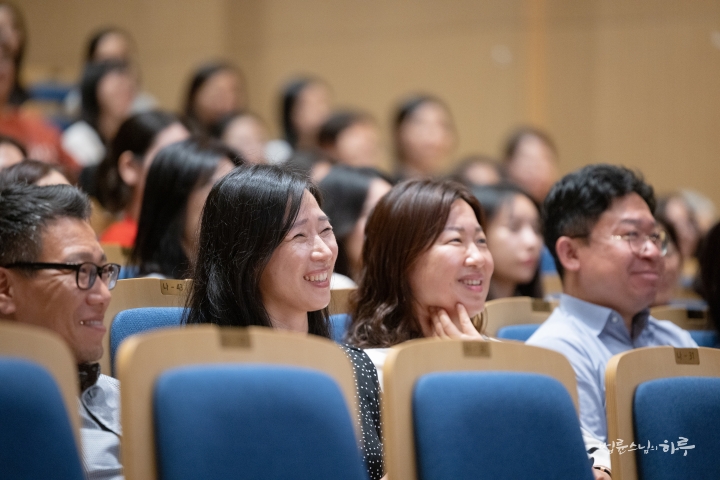
“Then just don’t set goals. If I planned to do something more but couldn’t, that’s not something to be disappointed about. For example, if I planned to help others but couldn’t, that’s not something to be disappointed about. If I’m lacking and living with help from others, I should work toward not needing help, but if I planned to help others, that’s a good thing—not being able to help doesn’t make it bad. You’re trying to do well but not doing it. That’s why it’s not something to be disappointed about. So the fact that you decided to pray is because you wanted to do well, and not doing it isn’t something to be disappointed about.
Second, let’s look at your career concerns. How old are you now?”
“Thirty-seven.”
“Don’t you have a job?”
“I have a job, but I’m still confused about the direction or career path I’m definitely aiming for.”
“If you have a job, what other career path is there? Are you planning to quit and do something else?”
“When I think about the future, I haven’t found the field where I want to grow more professionally.”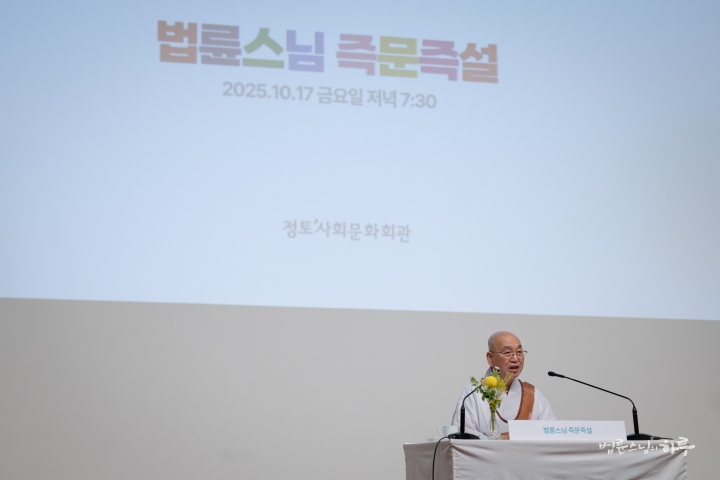
“That’s fine. If you didn’t have a job, you’d need to find one, but you already have a job. You just haven’t decided which field to choose within it. Then you can decide while working. So that’s not a problem either.
Third, you asked for a prayer to recite every morning, right? Before I give you a prayer, there’s something we need to look at first. You have a wife and a baby on the way, but compared to other heads of households your age, you feel disappointed and anxious because you don’t seem settled yet. Among people your age, there are many who haven’t married and many who don’t have jobs. So if you’re married, have a baby on the way, and have a job, that’s enough. For example, if I became a monk but couldn’t decide whether to practice chanting, meditation, or sutra reading, to others this wouldn’t be an important matter. If it gets decided, I’ll do it accordingly; if not, there’s no problem. 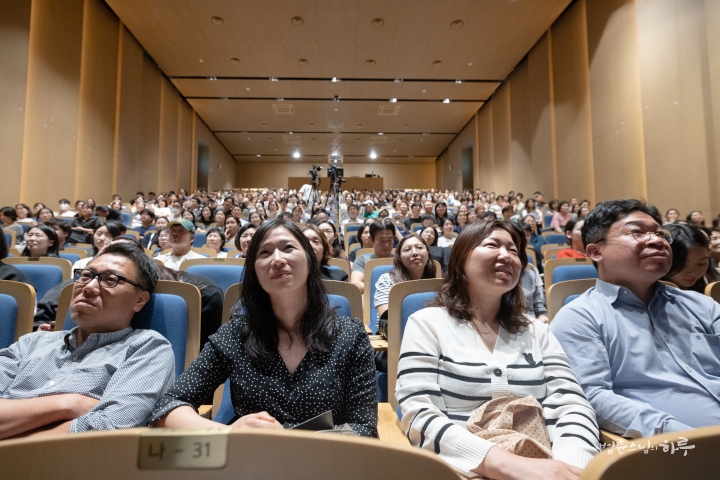
So the fact that you got married at thirty-seven is already quite an achievement. On top of that, having a job is another great accomplishment. Of course, it would be nice if you could do morning practice every day. But not doing it doesn’t mean there’s a big problem. Even at work, if your role is decided, you just do what’s assigned, and if it’s not decided, that’s not a problem either.
If you had already had one child and asked me whether to have one more or two more, I would say that’s not something to worry about. Similarly, your problem isn’t that you’re not married, don’t have a job, or don’t have children – you’re just feeling some kind of psychological pressure that something is lacking. You feel inadequate because you’re comparing yourself to wealthy people your age, or to someone who has five children, or to someone who became a company president at a young age. Generally speaking, being thirty-seven with a job, married with one child means you’re well-established. There’s no problem at all, but you’re creating problems for yourself, and then asking for a prayer to solve them. So pray like this: ‘I have no problems.’ Every morning when you bow, pray ‘I have no problems. I am doing well.’ That’s all you need to do.”
“Yes, thank you.”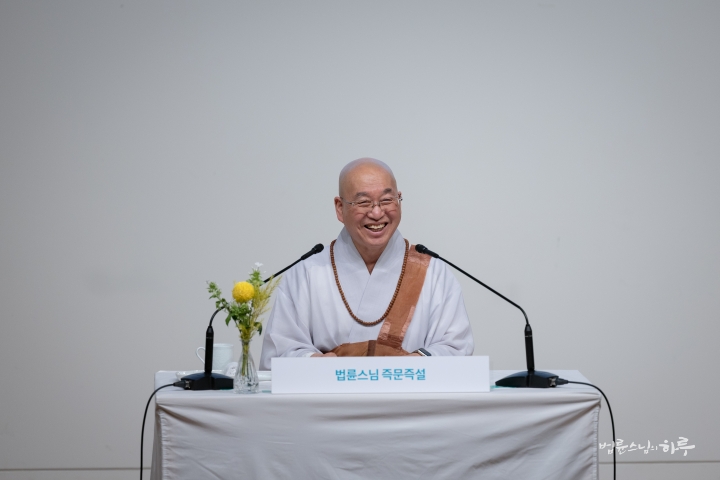
“Why should I have to tell you that you don’t have problems? Even if I said ‘You have problems,’ you should be able to say ‘I have no problems.’ That would be normal. But all of you keep saying ‘I have problems’ even when everyone else says you don’t. If you keep thinking you have problems when everyone else says you don’t, that’s evidence of a psychological issue. Due to psychological pressure, you constantly feel inadequate. When you always compare yourself to those who are better off, you’ll always feel lacking. That’s why I asked you to be specific. You mentioned three specific things, and after checking all three, you have no problems at all.
If you say ‘I’m so sorry I couldn’t help others,’ I would respond ‘That’s nothing to be sorry about. Helping is good, but not helping isn’t bad.’ If you say ‘I’m raising my child well. Isn’t that great?’ I would answer ‘That’s nothing special. Even rabbits do that.’ Not doing what you should do is bad, and doing what you don’t have to do is good. Not doing good things causes no problems. Not raising your own child is bad, but not taking care of your parents isn’t bad. Taking care of parents is a good thing, but not doing so doesn’t make it bad. Not properly caring for your child is bad, but caring for your child isn’t necessarily doing something good.”
“Listening to Sunim’s words has given me great comfort. I realized that my feelings arose from comparing myself only to those who are higher or more accomplished than me. I now understand that I have no problems. Thank you.”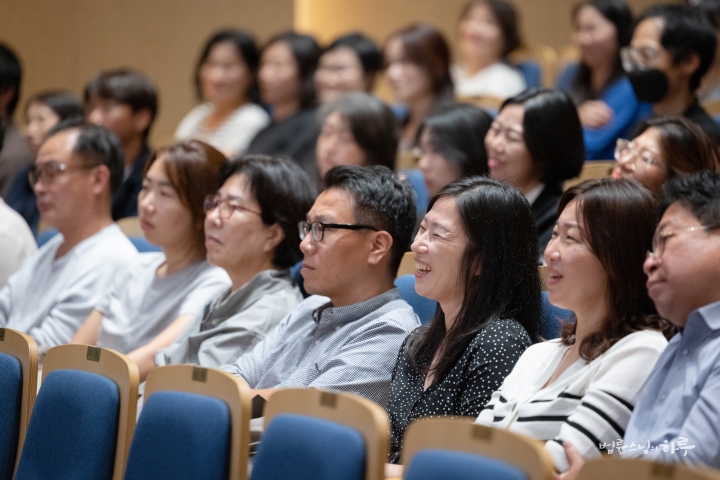
Questions continued to flow.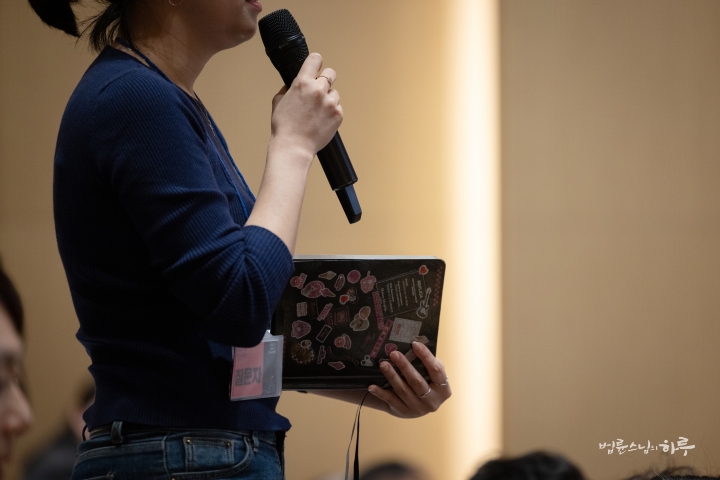
I feel greatly disappointed in myself due to the gap between my ideal life and my reality. How can I let go of this ego and trust myself?
I’ve worked with my husband for 20 years, but financial difficulties and conflicts are growing. How can I persuade him to work separately without hurting his feelings?
When my physical condition isn’t good, my mind also becomes heavy and withdrawn. How can I maintain mental equilibrium without being swayed by my physical state?
My husband of 40 years had an affair and now wants to leave home to live alone. How should I accept this situation while dealing with loneliness and anger?
As the dialogue deepened, Sunim briefly introduced the Youth Festa event scheduled for early November.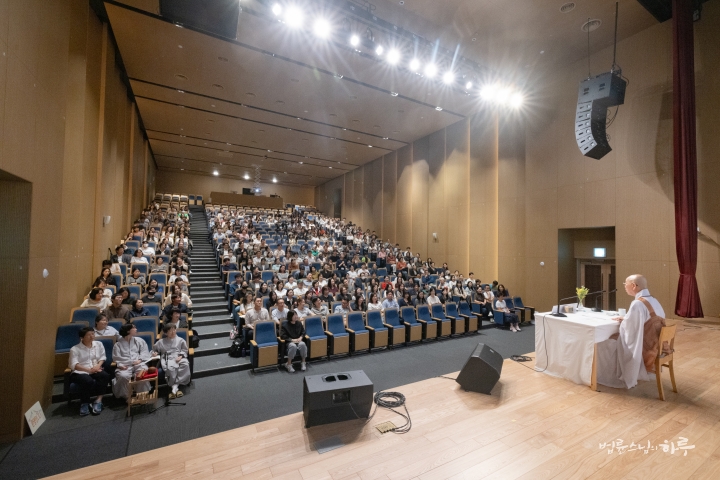
“For the older generation, today’s Republic of Korea is a source of pride. We’ve grown from a time when we worried about our next meal to a nation recognized by the world. However, Korea looks different through the eyes of young people. Reality is harsh enough for them to coin the self-deprecating term ‘Hell Joseon.'”
Two Koreas, Young People Making Dangerous Choices
The recent criminal organization incident in Cambodia illustrates this well. Korean youth are turning down jobs that pay 120,000-150,000 won per day, falling instead for sweet temptations like ‘Just lend us your bank account for 10 million won.’ Ironically, hundreds of thousands from Southeast Asia are coming to Korea looking for work. Yet our young people are falling into criminal traps, being used as cash couriers, and in severe cases, facing confinement, torture, and even losing their lives. Despite media warnings, young people continue their dangerous departures. When blocked at airports, they leave through third countries. They become both victims of criminal organizations and perpetrators against their fellow citizens – a tragic situation. This isn’t simply a matter of right and wrong. It’s a signal showing how desperate young people’s situations have become. 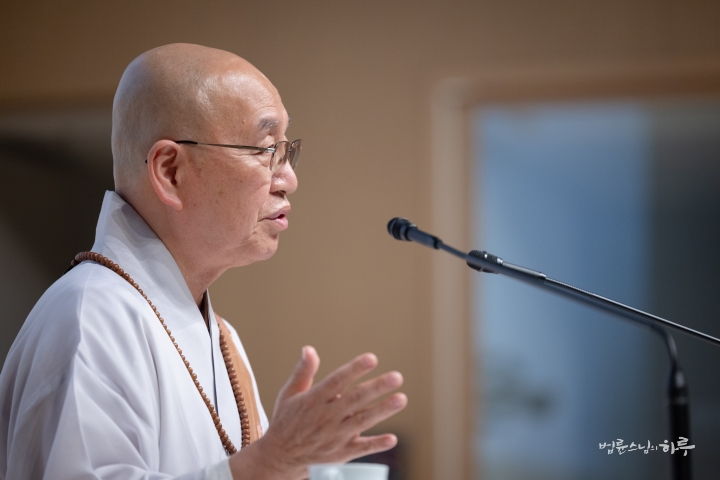
Youth Festa with Young People
In response, the Jungto Social and Cultural Center has organized ‘Youth Festa’ to help young people escape isolation, communicate, and find hope. It’s a festival for people in their 20s and 30s, running for three days from November 7-9 (Friday, Saturday, Sunday). Using all spaces from the basement to the rooftop of the Jungto Social and Cultural Center, various programs are prepared including lectures, experiential activities, food, crafts, and meditation. It will be divided into 7 sessions, with about 1,500 people able to participate per session. If applicants exceed 10,000, it will be an event exclusively for young people. If there are around 5,000 applicants, it will also operate as a family program where parents can participate together. It’s an opportunity for young people to participate joyfully and find new hope. Please spread the word widely to young people in their 20s and 30s around you.” 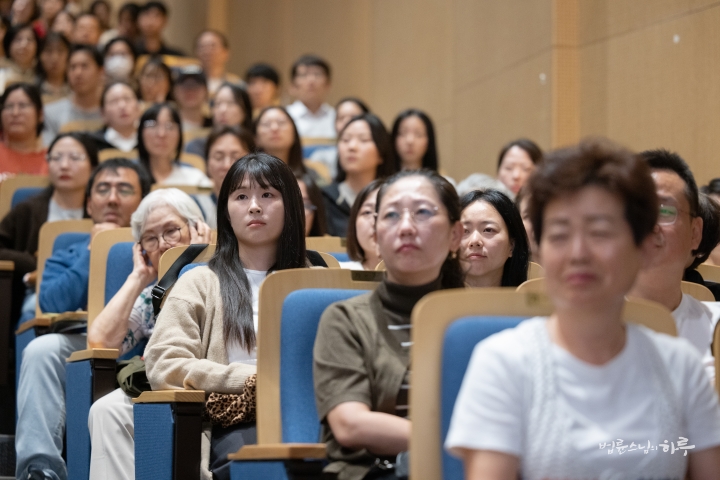
After finishing the conversation, it was past 9 PM. Sunim concluded the lecture with the Four Great Vows, promising to meet again at the same time next week.
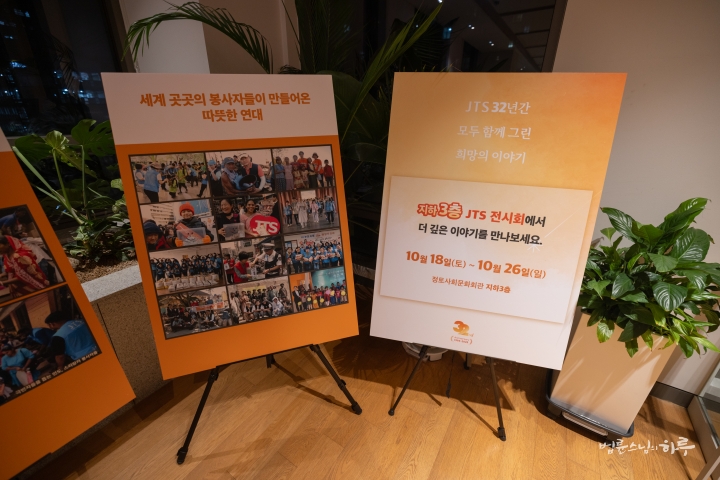
Tomorrow morning, Sunim will hold an online Dharma Q&A session for new students of Jungto Dharma School. In the afternoon, he will participate in an online unification festival organized by Good Friends with North Korean defectors. In the evening, he will give an online Dharma Q&A lecture for medical professionals.





